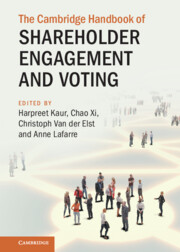Book contents
- The Cambridge Handbook of Shareholder Engagement and Voting
- The Cambridge Handbook of Shareholder Engagement and Voting
- Copyright page
- Contents
- Figures
- Tables
- Contributors
- Preface
- In Memoriam
- Abbreviations
- Introduction
- Part I Asia
- Part II Australia and North America
- Part III Europe
- 13 Shareholder Democracy in Denmark: Contrasting Law on the Books and Law in Practice
- 14 Shareholder Engagement and Voting in France
- 15 Shareholder Engagement in Germany
- 16 Shareholder Engagement and Voting in Greece
- 17 Shareholder Engagement and Voting in Italy
- 18 Shareholder Voting and Engagement in Norway
- 19 Shareholder Voting and Engagement in the Netherlands: The Dutch Institutional Approach
- 20 Shareholder Engagement and Voting in the United Kingdom
- Part IV Comparative Perspectives
- Index
13 - Shareholder Democracy in Denmark: Contrasting Law on the Books and Law in Practice
from Part III - Europe
Published online by Cambridge University Press: 10 September 2022
- The Cambridge Handbook of Shareholder Engagement and Voting
- The Cambridge Handbook of Shareholder Engagement and Voting
- Copyright page
- Contents
- Figures
- Tables
- Contributors
- Preface
- In Memoriam
- Abbreviations
- Introduction
- Part I Asia
- Part II Australia and North America
- Part III Europe
- 13 Shareholder Democracy in Denmark: Contrasting Law on the Books and Law in Practice
- 14 Shareholder Engagement and Voting in France
- 15 Shareholder Engagement in Germany
- 16 Shareholder Engagement and Voting in Greece
- 17 Shareholder Engagement and Voting in Italy
- 18 Shareholder Voting and Engagement in Norway
- 19 Shareholder Voting and Engagement in the Netherlands: The Dutch Institutional Approach
- 20 Shareholder Engagement and Voting in the United Kingdom
- Part IV Comparative Perspectives
- Index
Summary
Under Danish law, the general meeting is omnipotent, meaning that it can decide on most issues, including issues that deal with day-to-day management of the company. Thus, in theory, shareholders are in a position to ensure that the general meeting decides most issues of concern to them, and the rules on calling a general meeting or proposing topics for the meeting agenda are also rather generous to shareholders. In practice, however, shareholders rarely call a meeting. Although they occasionally propose issues for the meeting agenda, those proposals are almost always voted down by a very high majority. Therefore, the potential for shareholder democracy and activism is not being exploited by shareholders in Denmark.It seems that in normal circumstances, a board will propose agenda items only when the law requires it to do so. We did find, however, that shareholders often ask questions and engage in debate at general meetings. We therefore conclude that shareholder democracy and activism are present in Denmark, although most likely it often takes place as interaction between the board and major shareholders before general meetings are held.
Keywords
- Type
- Chapter
- Information
- The Cambridge Handbook of Shareholder Engagement and Voting , pp. 263 - 279Publisher: Cambridge University PressPrint publication year: 2022

